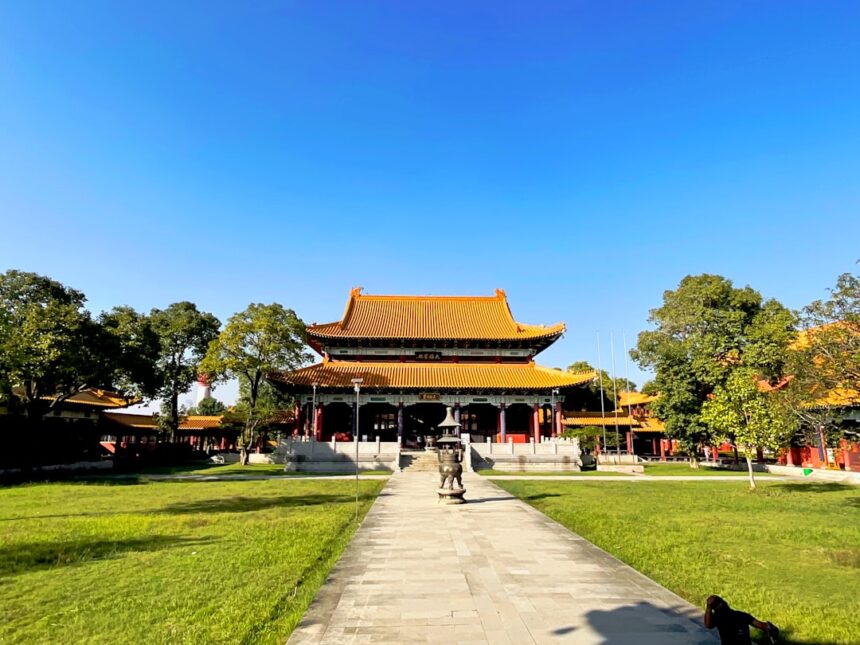Spiritual awakening is a profound experience that often marks the beginning of a transformative journey in your life. It is a moment when you become acutely aware of your existence, your purpose, and the interconnectedness of all things. This awakening can manifest in various ways, from a sudden epiphany to a gradual realization that unfolds over time.
You may find yourself questioning the status quo, seeking deeper meaning in your experiences, and feeling an insatiable curiosity about the nature of reality.
As you delve into the concept of spiritual awakening, you may discover that it is not merely a one-time event but rather an ongoing journey.
It invites you to explore the depths of your consciousness and encourages you to seek answers to the questions that have long lingered in your mind. You might feel a pull towards practices such as meditation, yoga, or mindfulness, which can help you connect with your inner self and facilitate this awakening process. Understanding spiritual awakening is about recognizing that it is a personal journey, unique to each individual, and that it can lead to profound insights and transformations.
Key Takeaways
- Spiritual awakening is a process of inner transformation and self-discovery.
- Beyond the initial bliss, the spiritual journey involves facing and embracing reality.
- Challenges in spiritual awakening can be navigated with mindfulness and presence.
- Finding balance is essential in integrating spiritual awakening into daily life.
- Seeking support and guidance can help in embracing the gifts of spiritual awakening.
The Journey Beyond Bliss
While the initial stages of spiritual awakening may be filled with blissful moments and heightened awareness, the journey does not end there. As you progress, you may encounter challenges that test your resolve and commitment to your spiritual path. The blissful state can sometimes give way to confusion, doubt, and even despair as you confront the shadows within yourself.
This phase is essential for growth, as it pushes you to dig deeper and confront aspects of yourself that you may have previously ignored or suppressed. You might find that the journey beyond bliss involves a deeper understanding of your emotions and experiences. It requires you to embrace the full spectrum of human existence, including pain, loss, and uncertainty.
This phase can be uncomfortable, but it is also an opportunity for profound healing and transformation. By acknowledging and processing these emotions, you can cultivate resilience and strength that will serve you well on your spiritual journey. Remember that this part of the journey is not a detour but rather an integral aspect of your growth.
Embracing the Reality of Spiritual Awakening

Embracing the reality of spiritual awakening means accepting that it is not always a smooth or linear process. You may experience moments of clarity followed by periods of confusion, and this ebb and flow can be disorienting. It is crucial to recognize that these fluctuations are part of the journey and that they contribute to your overall growth.
By accepting this reality, you can cultivate patience and compassion for yourself as you navigate the ups and downs of your spiritual path. As you embrace the reality of spiritual awakening, you may also find that it challenges your relationships with others. Friends and family may not understand the changes you are undergoing, leading to feelings of isolation or misunderstanding.
It is essential to communicate openly with those around you about your experiences while also being mindful of their perspectives. This balance can help foster understanding and support as you continue on your journey.
Navigating the Challenges of Spiritual Awakening
| Challenges | Strategies |
|---|---|
| Emotional Turmoil | Practicing mindfulness and self-care |
| Confusion and Uncertainty | Seeking guidance from spiritual mentors or counselors |
| Physical Symptoms | Engaging in gentle physical activities like yoga or walking |
| Relationship Changes | Communicating openly and honestly with loved ones |
| Existential Questions | Exploring different spiritual practices and belief systems |
Navigating the challenges of spiritual awakening requires courage and resilience. You may encounter various obstacles along the way, such as self-doubt, fear of judgment, or resistance from those around you. These challenges can feel overwhelming at times, but they also present opportunities for growth and self-discovery.
By facing these obstacles head-on, you can develop a deeper understanding of yourself and your spiritual path. One effective way to navigate these challenges is through self-reflection and introspection. Taking time to journal or meditate can help you process your thoughts and emotions, allowing you to gain clarity on your experiences.
Additionally, seeking out supportive communities or like-minded individuals can provide encouragement and validation as you navigate this transformative journey. Remember that you are not alone in facing these challenges; many others have walked a similar path and can offer valuable insights and support.
Finding Balance in Spiritual Awakening
Finding balance during your spiritual awakening is essential for maintaining your well-being and ensuring that your journey remains fulfilling. As you explore new ideas and practices, it can be easy to become consumed by your spiritual pursuits, neglecting other aspects of your life. Striking a balance between your spiritual growth and everyday responsibilities is crucial for sustaining your journey over the long term.
To achieve this balance, consider setting boundaries around your spiritual practices. Allocate specific times for meditation or reflection while also ensuring that you dedicate time to work, relationships, and self-care.
Remember that spirituality is not separate from life; it is woven into every moment, and finding balance will help you appreciate its presence in all aspects of your existence.
Connecting with Your Higher Self
Connecting with your higher self is a vital aspect of spiritual awakening that can lead to profound insights and guidance. Your higher self represents the most authentic version of who you are—a source of wisdom, intuition, and clarity. Establishing this connection requires patience and practice but can ultimately enhance your spiritual journey significantly.
To connect with your higher self, consider incorporating practices such as meditation or visualization into your routine. These techniques can help quiet the mind and create space for deeper insights to emerge. As you cultivate this connection, pay attention to any intuitive nudges or feelings that arise; they may provide valuable guidance on your path.
Trusting in this connection can empower you to make decisions aligned with your true self, leading to greater fulfillment in all areas of life.
Embracing the Shadow Side of Spiritual Awakening
Embracing the shadow side of spiritual awakening is an essential part of the process that often goes unacknowledged. The shadow represents the parts of yourself that you may have repressed or denied—your fears, insecurities, and unresolved emotions. Confronting these aspects can be challenging but ultimately liberating as it allows for healing and integration.
As you embark on this journey of embracing your shadow side, approach it with compassion and curiosity rather than judgment. Acknowledge that these parts of yourself are not inherently negative; they are simply aspects of your human experience that deserve recognition and understanding. Engaging in practices such as shadow work or therapy can provide valuable tools for exploring these hidden facets of yourself.
By shining a light on your shadow side, you create space for healing and transformation.
Cultivating Mindfulness and Presence
Cultivating mindfulness and presence is a powerful practice that can enhance your spiritual awakening experience. Mindfulness involves being fully present in each moment without judgment or distraction. This practice allows you to connect more deeply with yourself and the world around you, fostering a sense of peace and clarity.
To cultivate mindfulness, consider incorporating simple practices into your daily routine. This could include mindful breathing exercises, paying attention to sensations in your body, or engaging fully in activities without multitasking. As you develop this awareness, you may find that it becomes easier to navigate the challenges of spiritual awakening with grace and ease.
Mindfulness encourages you to embrace each moment as it comes, allowing for a more profound appreciation of life’s beauty.
Integrating Spiritual Awakening into Daily Life
Integrating spiritual awakening into daily life is essential for sustaining the insights gained during this transformative journey. It involves finding ways to incorporate spiritual practices into your routine while remaining grounded in everyday responsibilities. This integration allows spirituality to become a natural part of who you are rather than something separate from your daily existence.
Consider creating rituals or routines that honor your spiritual journey while fitting seamlessly into your life. This could involve starting each day with a few moments of gratitude or reflection or setting aside time for meditation during lunch breaks. By weaving spirituality into the fabric of your daily life, you create opportunities for growth and connection at every turn.
Seeking Support and Guidance on the Spiritual Path
Seeking support and guidance on your spiritual path is not only beneficial but often necessary for navigating the complexities of awakening. Connecting with mentors, teachers, or supportive communities can provide valuable insights and encouragement as you explore your journey. These connections can help validate your experiences while offering new perspectives that enrich your understanding.
Consider exploring local workshops, online courses, or spiritual groups where like-minded individuals gather to share their experiences. Engaging with others on similar paths can foster a sense of belonging and community while providing opportunities for learning and growth. Remember that seeking support does not signify weakness; rather, it demonstrates a commitment to deepening your understanding of yourself and the world around you.
Embracing the Gifts of Spiritual Awakening
Embracing the gifts of spiritual awakening involves recognizing the profound transformations that occur as a result of this journey. These gifts may manifest in various forms—heightened intuition, increased empathy, or a deeper sense of purpose in life. By acknowledging these gifts, you can cultivate gratitude for the experiences that have shaped your path.
As you embrace these gifts, consider how they can be shared with others. Your unique insights and experiences can inspire those around you on their journeys toward self-discovery and healing. By embodying the lessons learned through spiritual awakening, you contribute positively to the collective consciousness while enriching your own life experience.
In conclusion, spiritual awakening is a multifaceted journey filled with challenges, insights, and profound transformations. By understanding its complexities and embracing both its light and shadow aspects, you can navigate this path with grace and authenticity. Remember that each step taken on this journey brings you closer to connecting with your true self while fostering a deeper understanding of the world around you.
In the journey of spiritual awakening, many individuals anticipate a state of perpetual bliss and enlightenment. However, the reality can often be more complex and challenging. An insightful article on this topic can be found on Unplugged Psych, which delves into the nuances of spiritual awakening without the constant presence of bliss. This piece explores the emotional and psychological aspects of awakening, emphasizing that the path to spiritual growth can involve discomfort and struggle. For a deeper understanding, you can read more about these experiences in the article available at Unplugged Psych.
FAQs
What is spiritual awakening without bliss?
Spiritual awakening without bliss refers to the experience of a profound shift in consciousness or awareness without the accompanying feelings of joy, happiness, or euphoria typically associated with spiritual awakening.
What are the common signs of spiritual awakening without bliss?
Common signs of spiritual awakening without bliss may include a sense of disorientation, emotional turmoil, feelings of emptiness, and a deep questioning of one’s beliefs and identity.
What causes spiritual awakening without bliss?
Spiritual awakening without bliss can be caused by a variety of factors, including unresolved emotional trauma, intense introspection, existential crises, and the process of confronting deep-seated fears and insecurities.
How can one cope with spiritual awakening without bliss?
Coping with spiritual awakening without bliss may involve seeking support from a therapist or spiritual counselor, practicing self-care and self-compassion, engaging in mindfulness and meditation, and exploring alternative spiritual practices that resonate with one’s experience.
Is spiritual awakening without bliss a common experience?
While spiritual awakening without bliss may not be as widely discussed as experiences of spiritual awakening accompanied by feelings of bliss, it is a relatively common and valid experience for many individuals on the spiritual path.





